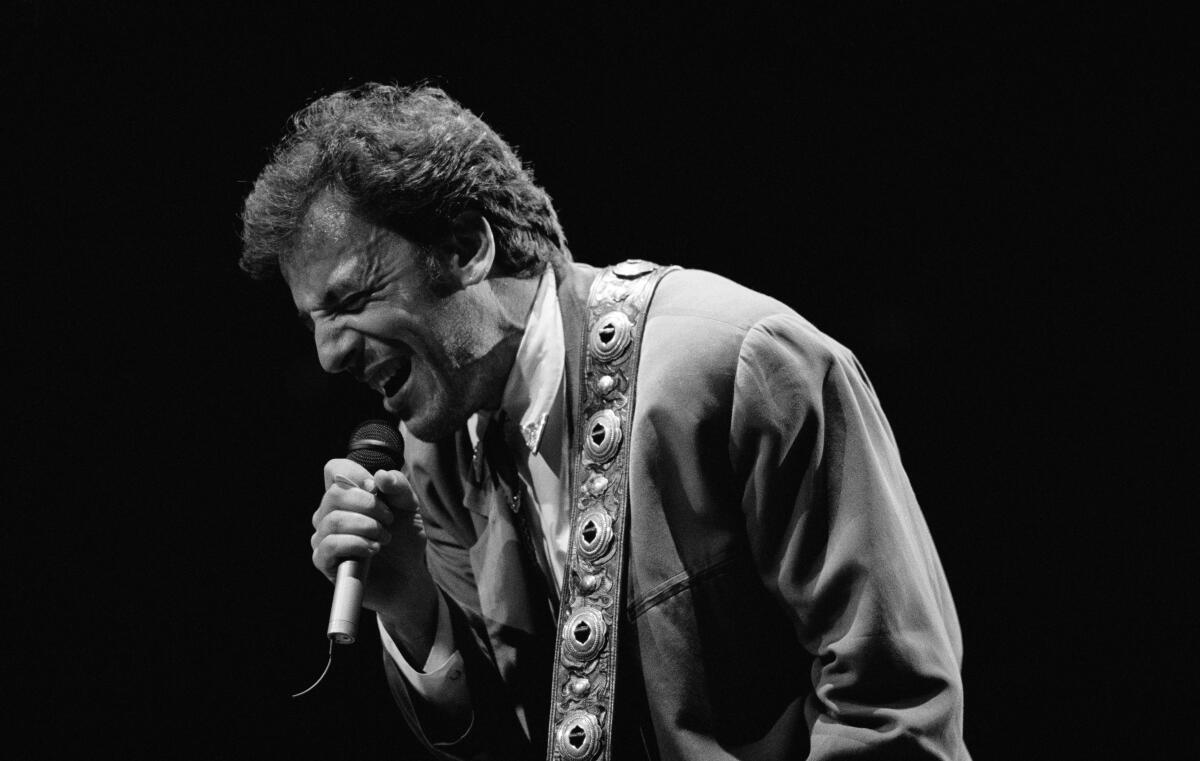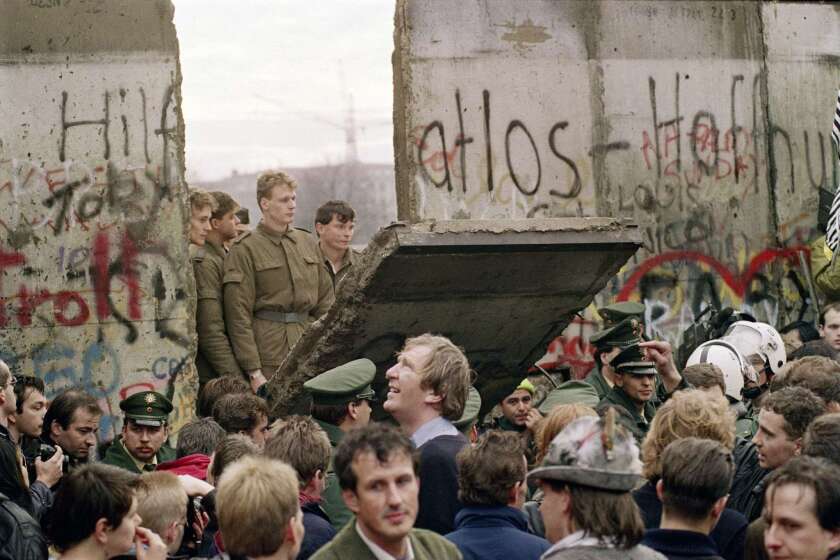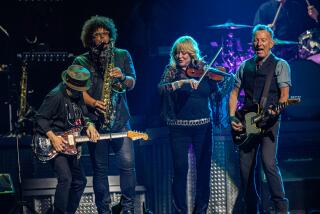Who brought down the Berlin Wall? It might have been the Boss

BERLIN — Did rock ’n’ roll help bring down the Berlin Wall?
Three decades after the collapse of the iconic Cold War barrier and communist governments across Eastern Europe, some say that the yearning for a Western way of life, as exemplified and amplified by rock, contributed to the events of Nov. 9, 1989, that so abruptly changed the world.
In particular, they point to a riveting rock concert and anti-Berlin Wall speech by Bruce Springsteen deep inside East Berlin for 300,000 frenzied East Germans about a year earlier as a stepping-stone toward change that may have had nearly as much impact as decades of political pressure — including President Reagan’s “Mr. Gorbachev, tear down this wall” address to about 20,000 in West Berlin two years before its collapse.
In 1962, two men from East Berlin attempted a daring escape to the West.
Germans, who on Saturday will mark the peaceful end of Berlin’s 28-year-long, 12-foot-high division with major celebrations, also recall a decades-long effort by East Germany’s hard-line government to keep out the sounds of Bill Haley, Elvis and the Rolling Stones.
Rock ’n’ roll was labeled as “decadent-negative,” “counter-propaganda” or a “weapon of NATO policy.” Some East German officials expressed concerns about young people becoming “recalcitrant” due to rock music, and official state dictionaries warned that the verboten sound “seduces young people to excesses … and serves as an instrument for psychological warfare that distracts young people from political issues.”
Eventually, the same government that killed at least 140 people trying to escape over the wall to the West learned that it was futile to try preventing the sound of youth filtering over the wall to the East. The ban was scrapped, and the government even started distributing limited numbers of albums by the Beatles, Springsteen and Michael Jackson through the state-owned Amiga label.
Springsteen’s July 19, 1988, concert, the largest in East German history, reflected the growing thirst for freedom of young people inside East Germany, which, unlike other Eastern European countries warming to Soviet leader Mikhail Gorbachev’s reforms, had continued to clamp down on its citizens.
Some 160,000 managed to get tickets to see the Boss, but more than 100,000 stormed the gates, Woodstock style, shortly before the show — an astonishing act of defiance at a time when East German police still routinely used force.
The Berlin Wall was built in 1961 to separate East and West Berlin and stood until a series of political changes and civil unrest led East Germany to allow citizens to visit West Germany in November 1989.
“The show in East Berlin was a major moment for us…. It was one of our greatest shows,” Springsteen said in an interview with German TV network WDR in 2016. “It was just the stakes involved. The band tends to play well when the stakes are very high. We knew going into East Berlin at that time that we were rolling the dice quite a bit. And then the amount of people that showed up … it was an epic evening for us. It just seemed like a very important show to play.”
Springsteen had wanted to perform in East Berlin since he first visited the communist city in 1981 as a tourist while on a Western Europe concert swing. But it took seven years before the communist authorities finally allowed him in to play. Among those who preceded him in prior months were Bob Dylan, Bryan Adams and Depeche Mode.
To win approval from the leaders of the communist government, the East German youth organization FDJ branded the Springsteen show with a communist stamp, labeling it a “Concert for Nicaragua” without informing him.
When Springsteen nearly canceled the day earlier after learning of the link with the 1979 Sandinista revolution and Nicaraguan President Daniel Ortega, banners promoting the connection were hastily taken down.
But it was too late to change the tickets, still bearing the billing, “Konzert fuer Nikaragua.”
In any case, authorities hoped Springsteen’s appearance would pacify restless East Germans clamoring for more reforms, freedoms and rock ’n’ roll.
In a new interview, Bruce Springsteen laughs about President Trump invoking his name in a rally speech and says, ‘We’re living in a frightening time.’
But Springsteen decided he would try to set the record straight about his motive with a short, powerful speech in German, which he had scrawled on a piece of paper: “I’m not here for or against any government. I’ve come to play rock ’n’ roll for you in the hope that one day all the barriers will be torn down.”
The crowd erupted in joy, fully understanding Springsteen’s reference. Some later said that it was a message they had been waiting their whole lives to hear.
He rammed the point home with a stirring rendition of Dylan’s “Chimes of Freedom,” belting out the final words with his band all but silent until the last line:
“Tolling for the achin’ ones whose wounds cannot be nursed
For the countless confused, accused, misused, strung-out ones and worse
And for every hung-up person in the whole wide universe
We gazed upon the chimes of freedom flashing.”
Manager Jon Landau said there were tears in Springsteen’s eyes as he and his bandmates left the stage. And the feeling was mutual.
“It was an incredible experience, and we all got goosebumps when it said that — we knew exactly what he meant even if he didn’t use the word ‘Wall,’ ” said Joerg Stempel, an East German music industry official who attended. “East Germans understood how to read between the lines and we all got what he was saying.”
Stempel said in an interview that it is probably impossible to point to the 1988 Springsteen concert or the spread of rock music into East Germany as a direct trigger for the fall of the wall.
“But Springsteen’s concert and others along with all the other cultural influences coming into East Germany from the West in the late 1980s that were designed to show that ... the country was open to the world outside actually only created an even greater yearning among East Germans for more freedoms,” he said. “The rock music, the lyrics, the atmosphere at concerts — all those things were adding up to move people in East Germany, shaking people up and were part of the motivation to rise up and act.”
It was not the first time that rock music had served as a catalyst for freedom in the shadow of the Berlin Wall.
In 1987, David Bowie performed in West Berlin in front of the Reichstag as thousands of East Berliners tried to listen from the other side of the wall. East German security police feared a mass escape and cleared the area, at times with force. Images on West German TV news the next day of East Germans being beaten for only wanting to hear the rock music prompted protests in East Germany and led the communist government to open a field deep inside East Berlin for concerts in the summer of 1988.
Jochen Staadt, a history professor at Berlin’s Free University, said it was astonishing that the communist rulers allowed Springsteen in, and showed that they were losing control when they could not halt the surge of fans without tickets.
“The Springsteen concert showed the people who were there and the many more who watched it on television how massive the public sentiment was for something that was actually so completely alien to the East German system,” said Staadt, who watched on television. “The East German government didn’t like it at all. But they had to accept it. There was a lot of pressure building, and the concert showed that. It was a signal that the times were changing.”
It would take 11 more months for an initial opening of the Iron Curtain from Hungary to Austria. And then, the Berlin Wall collapsed.
Hope M. Harrison, an associate professor of history and international affairs at George Washington University, said that rock music had had a profound impact on East Germans for decades. In 1969, she said, thousands reacted to utterly false rumors that the Rolling Stones would be performing atop a West Berlin newspaper building next to the wall. When they flocked to an area within earshot, some were thrown in jail for refusing orders of security police to leave an area where a concert was never planned.
“Rock is one of the many factors of things coming from the West that represented freedom that people in the East wanted,” Harrison said. “Rock music was this sort of beacon from the West. I think it was broader issues that brought down the wall, reflecting the frustrations of the East Germans. But for so many of them, it was rock music that got inside them as a symbol of freedom. And they wanted more of it.”
Special correspondent Kirschbaum is the author of “Rocking the Wall: The Berlin Concert That Changed the World.”
More to Read
Sign up for Essential California
The most important California stories and recommendations in your inbox every morning.
You may occasionally receive promotional content from the Los Angeles Times.











